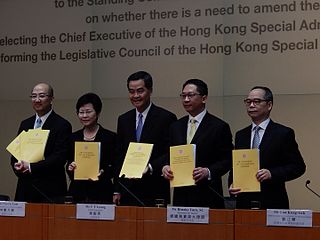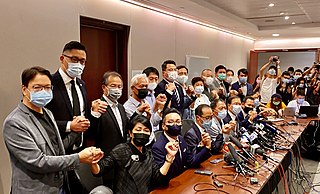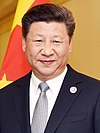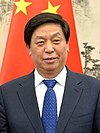
"One country, two systems" is a constitutional principle of the People's Republic of China describing the governance of Hong Kong and Macau since they became Special Administrative Regions (SARs) of China in 1997 and 1999 respectively.

The Standing Committee of the National People's Congress (NPCSC), officially the Standing Committee of the National People's Congress of the People's Republic of China, is the permanent body of the National People's Congress (NPC) of the People's Republic of China. Both the NPC and the NPCSC exercise the legislative power of the state.

The Basic Law of the Hong Kong Special Administrative Region of the People's Republic of China is a national law of China that serves as the de facto constitution of the Hong Kong Special Administrative Region (HKSAR). Comprising nine chapters, 160 articles and three annexes, the Basic Law was enacted under the Constitution of China to implement the Sino-British Joint Declaration.
Hong Kong Basic Law Article 23 is an article in the Basic Law of Hong Kong. It states that Hong Kong "shall enact laws on its own to prohibit any act of treason, secession, sedition, subversion against the Central People's Government, or theft of state secrets, to prohibit foreign political organizations or bodies from conducting political activities in the Region, and to prohibit political organizations or bodies of the Region from establishing ties with foreign political organizations or bodies."

Tam Yiu-chung, GBM, JP is a pro-Beijing politician in Hong Kong. He is a current member of the Standing Committee of the National People's Congress (NPCSC), former member of the Legislative Council of Hong Kong (LegCo) and former chairman of the pro-Beijing Democratic Alliance for the Betterment and Progress of Hong Kong (DAB).

The Liaison Office of the Central People's Government in the Hong Kong Special Administrative Region is an organ of the State Council of the People's Republic of China (PRC) in the Hong Kong Special Administrative Region (HKSAR). It replaced the New China News Agency (NCNA) as the representative of the PRC government in Hong Kong in 2000.

Carrie Lam Cheng Yuet-ngor is a Hong Kong politician serving as the fourth and current Chief Executive of Hong Kong since 2017. She served as Chief Secretary for Administration from 2012 to 2017 and Secretary for Development from 2007 to 2012.

The National People's Congress of the People's Republic of China, normally referred to as the National People's Congress, is the highest organ of state power and the national legislature of the People's Republic of China. With 2,980 members in 2018, it is the largest parliamentary body in the world. The National People's Congress meets in full session for roughly two weeks each year and votes on important pieces of legislation. Members are considered to be part-time legislators and are not paid.

The Hong Kong electoral reform was a proposed reform for the 2017 Hong Kong Chief Executive election and 2016 Legislative Council election.
The Decision of the Standing Committee of the National People's Congress on Issues Relating to the Selection of the Chief Executive of the Hong Kong Special Administrative Region by Universal Suffrage and on the Method for Forming the Legislative Council of the Hong Kong Special Administrative Region in the Year 2016, commonly known as the 31 August Decision, is a decision made by the Standing Committee of the National People's Congress (NPCSC), the national legislative body of the People's Republic of China (PRC) on 31 August 2014 which set limits for the 2017 Chief Executive election and 2016 Legislative Council election in the Hong Kong Special Administrative Region (HKSAR).

Erick Tsang Kwok-wai is a Hong Kong government official. Since 2020, he has been Secretary for Constitutional and Mainland Affairs, one of the principal officials of Hong Kong. Prior to that, he was Director of Immigration.

The 2019–20 Hong Kong protests, also known as the Anti-Extradition Law Amendment Bill Movement, were triggered by the introduction of the Fugitive Offenders amendment bill by the Hong Kong government. The bill would have allowed extradition to jurisdictions with which Hong Kong did not have extradition agreements, including mainland China and Taiwan. This led to concerns that Hong Kong residents and visitors would be exposed to the legal system of mainland China, thereby undermining Hong Kong's autonomy and infringing civil liberties. It set off a chain of protest actions that began with a sit-in at the government headquarters on 15 March 2019, a demonstration attended by hundreds of thousands on 9 June 2019, followed by a gathering outside the Legislative Council Complex to stall the bill's second reading on 12 June which escalated into violence that caught the world's attention.

The month of May in the 2019–20 Hong Kong protests saw a resurgence of protests. This was partly due to the containment of the coronavirus pandemic, with a total of less than 50 newly reported cases, and a small uptick in cases at the end of the month. These were the first major protests erupting since early March. Tensions increased again as police employed heavy-handed tactics including towards minors and journalists.
The decision of the People's National Congress on Establishing and Improving the Legal System and Enforcement Mechanisms for the Hong Kong Special Administrative Region to Safeguard National Security is a decision adopted by the third session of the thirteenth National People's Congress on 28 May 2020, to authorise the National People's Congress Standing Committee (NPCSC) to promulgate a national security law in Hong Kong.

The Hong Kong national security law, officially the Law of the People's Republic of China on Safeguarding National Security in the Hong Kong Special Administrative Region, is the piece of national security legislation concerning Hong Kong. Such a law is required under Article 23 of the Hong Kong Basic Law, which came into force in 1997 and stipulates that the law should be enacted by the Hong Kong Special Administrative Region. In June 2020, a partially equivalent law was enacted by the Chinese Standing Committee of the National People's Congress, rather than by the Hong Kong Legislative Council.
The 31st anniversary of Tiananmen Square protests of 1989 was principally events that occurred in China and elsewhere on and leading up to 4 June 2020 – to commemorate the Tiananmen Square massacre, in which thousands of people are widely believed to have been killed.

In early May 2020, the Chinese Government announced plans to draft a new national security law for Hong Kong, something required under Hong Kong Basic Law but which should explicitly be written and enacted by Hong Kong's own government. In response to apparent mainland intent to bypass Hong Kong's local legislature, the United Kingdom – which administered Hong Kong until 1997 – announced that if a security law drafted by China was approved, Britain would open a route for all Hong Kong residents born under British rule to become British citizens. Other nations and organisations have given various responses to the decision, to legislation plans, and ultimately the law itself as passed by the Chinese Standing Committee of the National People's Congress on 28 May 2020 with 2878 votes "for", 1 vote against, and 6 blank votes. At 9:30 am, 30 June 2020, the same Standing Committee unanimously voted to enact the law. The law became effective at 11 pm on the same day.

The Office for Safeguarding National Security of the Central People's Government in the Hong Kong Special Administrative Region (CPGNSO) is a state security agency established by the Hong Kong national security law. It is headed by director Zheng Yanxiong. The office is a part of and funded by the Central People's Government of China and is not subject to Hong Kong jurisdiction.

On 11 November 2020, 15 Hong Kong pro-democracy members of the Legislative Council announced their resignations in protest against the decision of the National People's Congress Standing Committee (NPCSC) which bars Legislative Council members from supporting Hong Kong independence, refusing to recognise Beijing's sovereignty over Hong Kong, seeking help from "foreign countries or foreign forces to interfere in the affairs of the region" or committing "other acts that endanger national security" that resulted in the disqualification of pro-democracy legislators Alvin Yeung, Dennis Kwok, Kwok Ka-ki and Kenneth Leung. In July 2020, the four had been barred from running in the subsequently postponed Legislative Council election originally scheduled for September 2020. The resignation en masse left the Legislative Council membership dwindled to 43 out of the total number of 70 seats, with virtually no opposition for the first time since the 1997 handover.

A draft of "improving the electoral system of the Hong Kong Special Administrative Region" by the National People's Congress (NPC) was published on 4 March 2021 to rewrite the election rules in Hong Kong to ensure ensure a system of “patriots governing Hong Kong.” By amending the Annex I and Annex II of the Basic Law of Hong Kong, the composition of the Legislative Council (LegCo) and the Election Committee (EC), which is responsible for electing the Chief Executive, would be drastically adjusted. A new vetting mechanism is to be created to vet every candidate running for the Chief Executive, the Legislative Council and the District Councils (DC). It is widely seen as a move to further curb the influence of the opposition pro-democracy camp in the wake of the widespread anti-government protests of 2019 and the electoral landslide of the 2019 District Council election.














